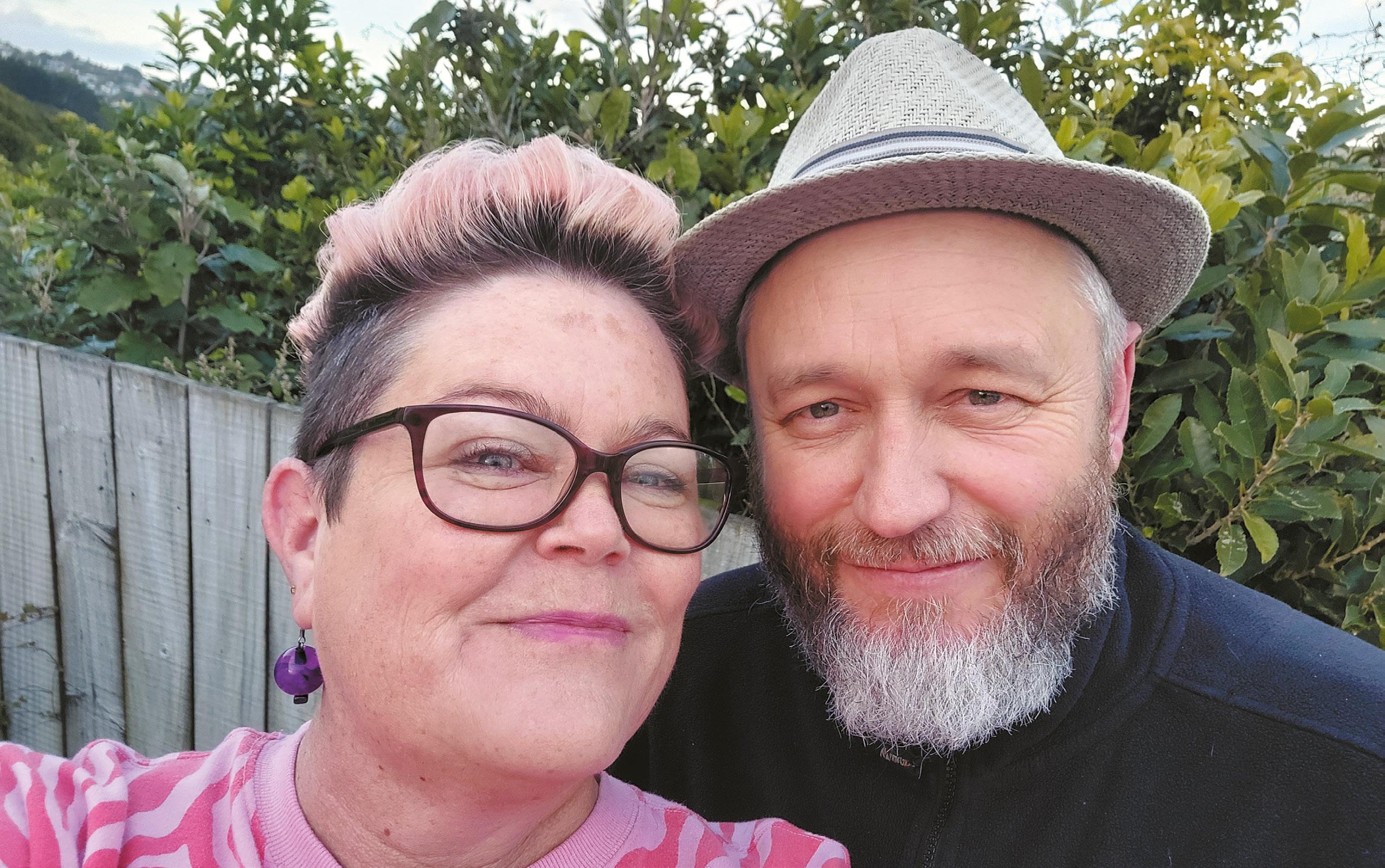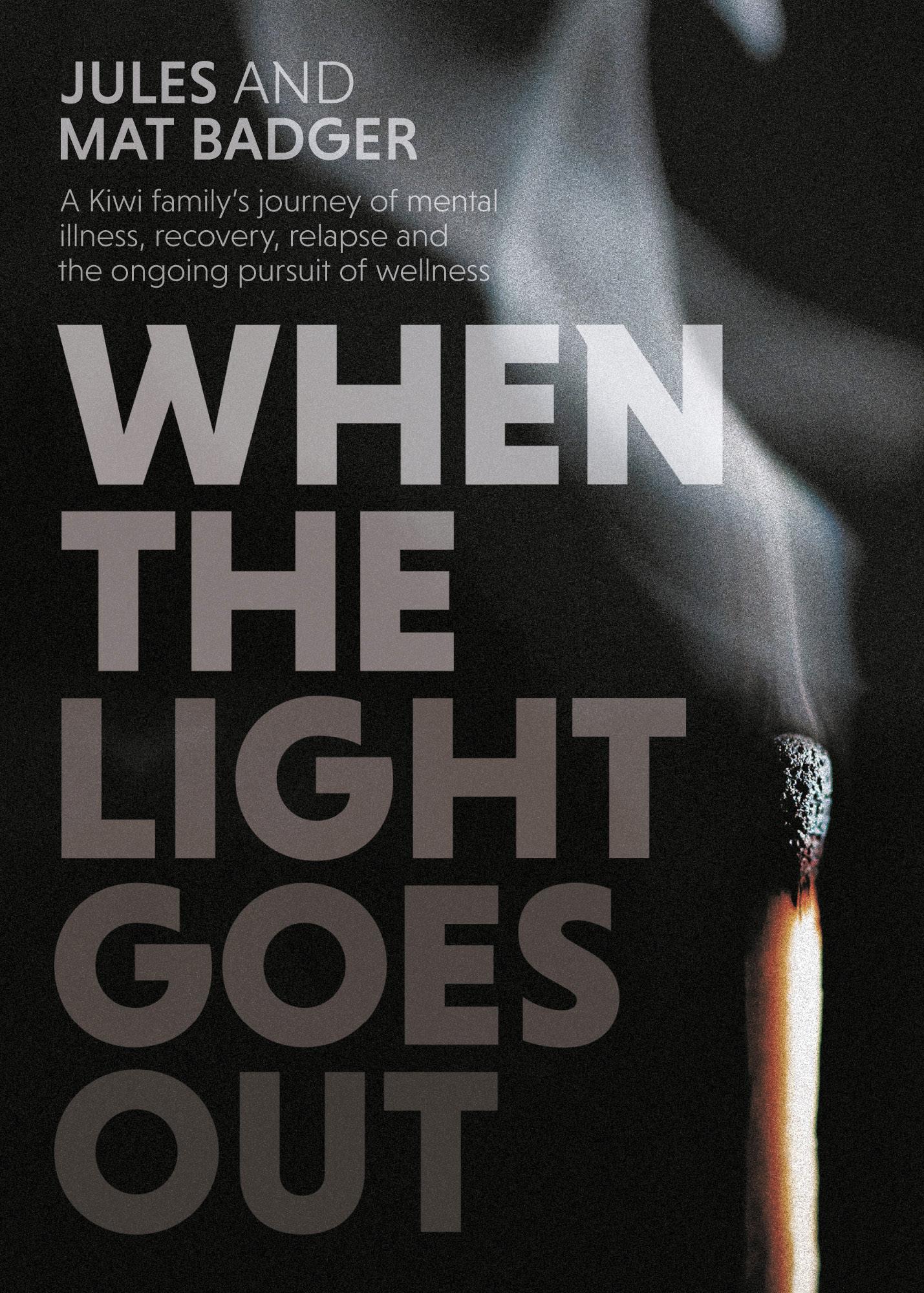
10 minute read
Glimpses of Light in a Time of Shadows
When the Light Goes Out is a book published by Salvation Army Flag Publications that has been a long time coming for authors Jules and Major Mat Badger. The book may have been completed three years ago during the Covid-19 lockdowns, but the story told within its pages has been a significant and often painful experience for the couple and their family.
WORDS Holly Morton-Chong
When the Light Goes Out looks back on Jules’ mental health crisis in 2012, while she was a corps officer at East City Corps in Howick, Auckland. Alongside Jules’ recollection of the circumstances that led to this, her husband Mat shares his own experiences during this time.
Jules’ mental distress was a serious and tense time for her family. She was convinced that she had lost her faith, and that her calling as an officer was a sham. But coming out the other side, Jules is grateful to celebrate a renewed and deeper faith. ‘If writing the book is my life’s most significant or useful service, then I’m okay about going through the darkness to achieve the end of knowing God more fully. God’s best plan for my life, for all our lives, is to know God and enjoy being with God. Everything else—our service and good deeds—comes from that relationship. I had to face the darkness to really understand that, and now my faith is so much richer for it.’
Mat and Jules see their learnings over this time as something that could be valuable for a range of people—for those experiencing mental distress, for their families and loved ones, for their church communities, and for their leaders in those faith spaces—and they hope that their experiences can encourage others to seek support and open up conversations around mental wellbeing.
For the individual
When the book is released, it will have been 11 years since Jules’ first breakdown. This has given her a perspective in hindsight that enables her to objectively consider what she had thought and felt at the time. ‘I read some parts of the book back now and I say, “I can’t believe I thought that was true about myself”. It’s good to look back and recognise the healing, and to see that what I believe about myself and about God now is very different.’
A rediscovering of the character of God also played a big part in Jules being able to journey out of the darkness. ‘I think for me that’s where the fingerprints of God were. I couldn’t see God at the time, but I’ve learnt that God is so much more generous than I knew. It’s really the story of how God drew me closer. My hope is that others will find this the most compelling part of the book. Not just that you can get through mental illness, or even that it is possible to learn more about God and develop a richer faith, but that you just might discover a bigger, more expansive God. I thought God had left me because I put him into a box. Now I leave the lid off!’
For the family
While they are hopeful that their story can encourage and enlighten others in similar situations, Jules and Mat found that the process of putting pen to paper was also therapeutic for them. ‘It’s been incredibly cathartic,’ Mat explains. ‘We went through seasons during writing when we’d write something, and I’d have to put it aside for a week because I was still emotionally processing everything. You’re reliving it while trying to articulate what was going on at that time.’
Jules and Mat see that one of the strengths of their book is having both of their perspectives present in the story: sharing Jules’ experience of breakdown, as well as Mat’s memories of that time. ‘We realised that Mat’s perspective was going to be an important part of the book, because I was so unwell and people needed to read a “well” perspective of those events,’ Jules explains. They hope that this method of sharing their story can be a comfort and encouragement for those with close friends and family going through times of poor mental health, and that it can offer some learnings and tools to help them protect their own wellbeing as carers.
In returning to these stories over the publishing process, Jules has noticed that her children seem to be better equipped to manage their own mental wellbeing than she was during the events of the book. ‘The awareness of mental health today is really encouraging; we grew up in a generation where you did not talk about it, but now you can go online and get tools to help. It’s common to hear, “It’s okay not to be okay” or “I’m having a low day”, and in most rooms someone is on anti-depressants, or has had an experience of burnout. We have language today that we didn’t have before, and that is a real gift,’ says Jules.
‘Our daughter, Gabbie, has acquired tools for her wellbeing that I didn’t learn until my forties, and she learnt them at 18. I think her generation is more empathetic, they are a lot more in touch with their emotions and feelings, and I think we’ve got a kinder world coming our way because of it.’
For the Church
Mat and Jules know that church communities can be places of rich opportunity to engage with, support and care for those struggling with grief, depression and mental distress. For Jules, what was most significant was a sense of normalcy and care that didn’t focus solely on her mental breakdown. She appreciated those in her church community who could treat her with love and respect that didn’t make her feel like a failed or broken leader.
Jules wants to highlight the importance of recognising that our church leaders are dealing with their own struggles, and that it is important to treat them with compassion and understanding. ‘It’s important for corps and congregations to know that their officers are human. Our pastors and officers aren’t Jesus, they are often—as was in my case—very ordinary Christians, and people need to remember that they are performing a function of leadership and they are not infallible saints.’
Regardless of whether someone in the church is a leader, elder or congregation member, the church body has a call from God to support those facing mental struggles, says Mat. ‘The church is called to care for the sick, and that includes the mentally ill. These days the world moves fast and we expect quick results. But God is patient and he is in it for the long haul, so the way he views things is very different.’ Mat and Jules hope that congregations can offer each other the time and space needed to properly care for those in their midst who are unwell, and that this can be an offering from the church to the wider community.
For the leaders
Despite the difficulties Jules was facing with leading at The Salvation Army during her breakdowns, she wants to acknowledge that the people around her in the Army were stabilising presences for her in a time of turmoil. Some of their close friends within the corps (church) visited Jules during her stay in respite care, and Jules was also relieved to know that Mat and their kids were being well taken care of while she was away.
‘Part of the reason why we wanted to write this book was to acknowledge that I was well cared for by the Army. Our divisional commander at the time was Colonel Heather Rodwell. Her care of me represented something of God and countered the competitiveness in the institution that had been my experience,’ Jules explains.
‘A lot of pastors who have been unwell will agree that even though we say “Oh, it’s all God’s doing”, we still go to conferences and ask each other: “How big is your church?” or “How big is your prayer meeting?” And part of that was how things were measured at the time, which fed into my own workaholism. Heather represented something counterculture that was very important for my self-acceptance and recovery.’

While Jules and Mat explain that The Salvation Army provides resources for its leaders, like spiritual direction and supervision, for Jules these support systems were not utilised as she struggled with the internal pressure to maintain a competent and upbeat leadership persona amid her mental health struggles. ‘My inner life was far from deep, because my public life was so busy. My role as a leader always superseded my life as a believer.’
In reflecting on their process of writing the book, Mat has been reassured by the power that God has in times of turmoil. ‘What I came out the other side of the journey with was this immense feeling that God’s in control. I came away saying, “we’re on the right track”.’
Jules has noted that the analogy of her faith has shifted. ‘To use the image of an ocean liner—well that was what my faith was like. It looked good and substantial on the surface, but there was nothing below—the anchor was small. My faith remained at surface level and I lived in fear of what might lurk in the depths below! But now my faith is a small reliable dinghy and there is life below the surface! The anchor is strong and holds fast. I’m not afraid of the deep anymore because treasure is found in the deep—that’s where I found God.’
Purchase the book
Jules and Mat’s book, When the Light Goes Out, is available from Salvationist Resources now.
Visit shop.sarmy.net.nz to purchase a copy and learn more about their inspiring journey.
The five saboteurs
The five saboteurs for church leaders, by Richard Black (Director of Mind Health), are a tool that Jules found valuable in reflecting on her own leadership. These are:
1. Over-identification with the role—when leaders have their own identity overly connected to their work as church leaders and connect any success or failure within that role to their own worthiness.
2. The shift from seeing ‘success’ through the lens of spiritual leadership to organisational growth—the anxiety of having to keep upping church numbers and its correlation with whether the ministry is successful can cause leaders to connect their personal wellbeing to the number of people attending their services.
3. The pull to perfectionism—a need to be perceived ‘perfectly’ in all aspects of life, including faith, marriage, parenting and lifestyle. Those with this saboteur feel the need to keep up appearances to remain professional in their leadership role.
4. Isolation—feeling separate to or ‘above’ their congregation within their leadership role, and having no one that they feel they can be honest and vulnerable with. Other leaders can be seen as competitors rather than a source of support.
5. Spiritual misdirection—when leaders read the Bible for sermon preparation rather than devotion; they pray in groups or for others, rather than for personal communion; they pray for the church to grow or difficult people to be removed; or they engage in spiritual activities or disciplines in order to offset guilt or because they feel they should.
Richard explains, ‘Any of these five saboteurs can be detrimental to a leader’s emotional health. These five saboteurs are often invisibly and unintentionally present, but they are the factors we need to become aware of so we don’t lose any more church leaders.’










